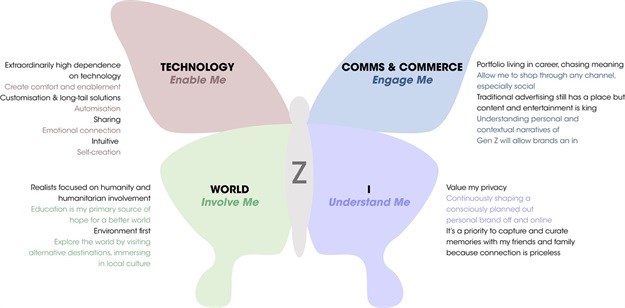The oldest of Generation Z (or iGen or Centennials) - that generation coming after the millennials and before what some are already referring to as the Alpha Generation - are now 22 years of age. And, it seems this generation does not have it easy, despite technology making life increasingly more seamless, exciting and enjoyable. Being careful to avoid stereotyping, one can cautiously state that they have been born into a Vuca world, to cite the trendy acronym for 'volatility, uncertainty, complexity, and ambiguity'.
According to published research, Gen Z are realists, will smartly and strategically plan for survival, carefully navigate life’s pitfalls and maximise the opportunity to live their life to the fullest. It also seems that this generation, the most global and diverse generation, upholds the values of family and society, and has a real concern for the environment. Its members are known as the first ‘caring’ generation and find their strength in collaboration and design thinking to engineer better, more humane solutions in commerce and standard of living. Their characteristics or traits can be summarised in the schematic alongside.
In some ways, Gen Z could be compared to a butterfly. Some are in a state of metamorphosis and some are already spreading their wings. On a more profound level, as they not only go through radical transformation but also radically transform the world that they affect, there are two key questions brand practitioners should be asking themselves:
- How do we build brands and create technology that offers lucrative solutions and offers ingenious platforms that can live up to Gen Z’s vivacious and most pragmatic expectations?
- How do we as brand practitioners attract these butterflies, that is, not chase them away or run around in circles trying to make sense of the phenomena that set them apart or make them unique?
This essay intends to assist them to find the answers. It starts with the most prevalent futuristic-orientated enabler – technology – before unpacking commerce and taking a view of Gen Z’s take on the world and their place in it. Finally, it seeks to explore the ‘I’: their identity.
The observations and projections outlined in this discussion are a synthesis of the research published on mainly a global Gen Zers. The South African Gen Z is isolated in some global studies but opportunity does exist to conduct in-depth research based on potential trends identified in this discussion specific for the South African context.
Enable me – technology
Gen Z puts its faith in technology. Technological advancements make Gen Z hopeful for the future. Its members are part of a sharing economy and believe that social media and the web should be used for good.
Most have also indicated that they would pay a premium for automation technologies, and the concept of ownership of these could become more questionable in future. This future holds high device-dependence, the expectation of information on demand, and a raised emotional connection with the digital world.
Technology is also seen as emotionally significant, more intuitive and intelligent, and a facilitator and enabler. This means the focus should be on tech’s ability to mimic human interaction and humanness in context of brand value and meaning.
In addition, with a wealth of information easily accessible on the internet, many Gen Zs have learned how to create smartphone apps and websites and have succeeded in marketing products of their labour to much larger, better-equipped tech companies.
This means that brands and tech that can create long-tail solutions enabling them to explore, learn, create and find business partners in a fast, economically viable and innovation focused manner will gain ground.
It also means brands will have to consider disrupting industries to make inroads. For example, good examples of brands using technology to disrupt and build are the free online education provider Coursera, ride-sharing app Uber and online marketplace and hospitality service Airbnb.
Engage me – Communication and commerce
Gen Z communicates across different platforms, often simultaneously via multiple screens, expecting responsive design and customised settings to fit its preferences. Communication via images in whatever shape or form accompanied by short, concise descriptors and clear calls-to-action is the only way to capture the few seconds that is granted to someone that would want to connect with them. Bite-sized content delivered via compelling narrative is certainly welcomed.
On social media, members of Gen Z use Instagram to showcase their aspirational selves, Snapchat to share real-life moments, Twitter to get the news, and Facebook for information. Connecting with Gen Z via email marketing is difficult without mastering the art of quick storytelling with a highly relevant value proposition.
It is no surprise that Gen Z is very negative towards online advertising and rather gravitates towards entertainment that engages and provides some form of utility to their lives. However, brands should not throw traditional advertising out with the bathwater as it has a major role to play in captive environments such as cinemas.
In entertainment, immersive experiences enabled by virtual reality will open opportunities for brands to connect as opposed to simply breaking through the clutter. The top engagement tactics include entertainment that is generally humorous, features good music, design and celebrities.
Brands that can create a community feeling with an open stance to value systems will maximise the brand’s ability to resonate. The ability for brands to sincerely tap into the stories of Gen Z will be the differentiator for success.
Work for Gen Zs is more about what they do and less about where they do it. Brands and tech ought to continuously evolve to facilitate and enable seamless multiple geolocation-based working environments that can mimic all facets of real-world interaction.
Industries are also evolving to create new careers where brands and tech permit fluidity and dynamism in both initial and continual development. Research has shown that Gen Z places a premium on really making a difference in the world, as opposed to joining the rat race on the self-gain treadmill.
To continue reading, click here:


















































